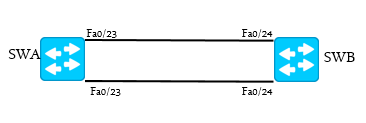Our new subject is : Etherchannel ! We are gonna talk about “what is etherchannel” , “how it works” and etc. First of all etherchannel is a great way to make load balancing.

As you can see from the figure above, etherchannel combines the switch ports and works it like a one link. There are four 1 giga links between two switches. Etherchannel combines them to 4 giga but that is not a physical link surely, that’s a logical link. There are two protocols that helps you implementing etherchannel :
1- PAGP ( Port Agg Protocol )
– PAGP is a Cisco proprieraty protocol.
– Port modes of PAGP are AUTO , DISERABLE and ON ( Best path ) .
2- LACP ( Link Agg Protocol )
– LACP is not a Cisco proprieraty protocol, it is an industry standart. ( 802.3AD )
– Port modes of LACP are PASSIVE , ACTIVE and ON
There are two types of etherchannel :
1- LAYER – 2 ETHERCHANNEL
Layer – 2 etherchannel is used on Layer -2 switches like Cisco 2960 etc.
CONFIGURING LAYER – 2 ETHERCHANNEL

SWITCH_A(conf)#interface range Fa0/23 - 24 SWITCH_A(conf-if)#channel protocol pagp SWITCH_A(conf-if)#channel group 1 mode desirable
*** Same commands are implemented on SW B too. But just channel group mode is made “auto” to make a match between auto and desirable.
Configuration is verified with these commands :
SWITCH_A#show ip interface brief SWITCH_A#show etherchannel detail
2- LAYER – 3 ETHERCHANNEL
Layer – 3 etherchannel is used on Layer -3 switches like Cisco 3750 etc.
Trick : It is enough that just one switch is Layer -3.
CONFIGURING LAYER – 3 ETHERCHANNEL

SWITCH_A(conf)#interface port-channel 1 SWITCH_A(conf-if)#no switchport SWITCH_A(conf)#ip address 10.1.1.1 255.255.255.0 exit SWITCH_A(conf)#interface range Fa0/23 - 24 SWITCH_A(conf-if)#no switchport SWITCH_A(conf-if)#channel group 1 mode desirable
- Same configs are made for the other switch too.
- All ports should be on the same speed and duplex mode.
- Ports that are using for etherchannel should be in same VLAN or configured trunk.
- If you make a change in port-channel, that effects all the ports connected to it !

